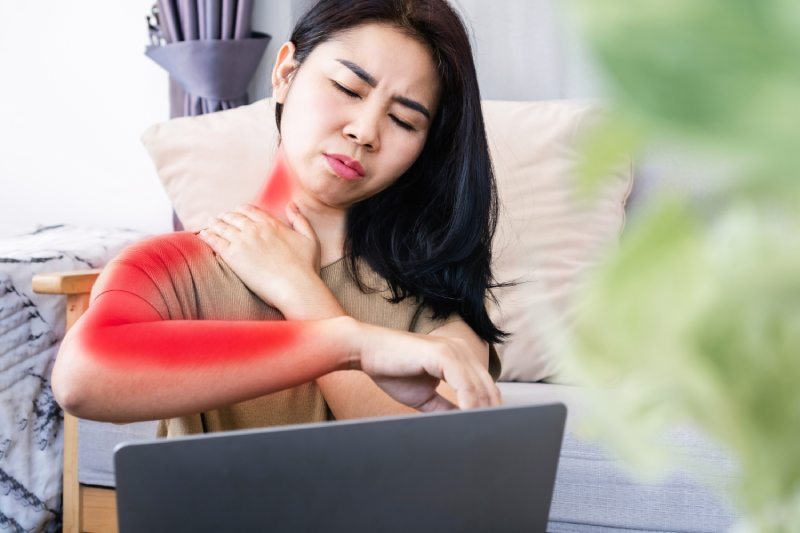Pinched Nerve in the Neck and Arm: How to Relieve Pain
- Desert Spine & Scoliosis Center

- Mar 21, 2023
- 3 min read

If you have a pinched nerve in your neck, arm pain may be one of the first signs of trouble. Let’s look at what causes a pinched nerve in the neck, its symptoms, and how you can relieve your discomfort.
What causes a pinched nerve in the neck and arm?
Pain can be a tricky thing. A person can experience pain in the arm from a condition in their neck. This could originate from your spine, from a pinched nerve in your spinal canal.
As the Cleveland Clinic points out, “A pinched nerve is a compressed nerve. Surrounding tissues that press on nerve roots can cause pain, numbness, and tingling in different areas of your body.” A pinched nerve in the neck and arm specifically can be caused by a variety of factors, including:
Herniated or bulging discs
When the discs in the neck become compressed, they can put pressure on the nerves that run through them, causing pain and discomfort.
Poor posture
Slouching or sitting in a hunched position can put stress on the neck, the cervical spine, and the upper back, leading to muscle tension and nerve compression.
Repetitive motions
Repeating the same motion over and over again, such as typing on a computer or playing a musical instrument, can cause inflammation and compression of the neck muscles and nerves in the neck and upper back.
Trauma or injury
A fall, car accident, or sports injury can damage the nerves in the neck and upper back, leading to a pinched nerve.
Arthritis
Arthritis can cause the joints in the neck and upper back to become inflamed and swollen, putting pressure on the nerves that run through them.
If you suspect that a pinched nerve in the neck is causing your arm pain, it’s important to see your doctor right away.
What are the symptoms of a pinched nerve in the neck?

The symptoms you may experience from a pinched nerve in the neck can vary depending on which nerve is affected and the severity of the compression. Common symptoms include:
Pain or discomfort in the neck: This can range from a dull ache to sharp pain.
Pain that radiates down the arm: The pain may feel like a shooting or electric shock-like sensation.
Weakness or numbness in the arm: You may experience weakness in the arm or hand, or a loss of sensation or feeling.
Tingling or pins and needles sensation: You may feel a prickly or tingling sensation in the affected area.
Muscle spasms or cramps: You may experience involuntary muscle movements or cramps in the affected area.
Limited range of motion: You may find it difficult to move your neck or arm in certain directions.
Pain relief for a pinched nerve in the neck
Your doctor can recommend ways to relieve neck pain caused by a pinched nerve. Generally, and ideally, your doctor will start with the most conservative treatment plan possible for your specific diagnosis. The course of treatment will vary based on what is causing your neck pain, but may include
Pain relieving anti-inflammatory drugs (NSAIDs).
Ice or heat therapy.
Exercise.
Injections
In some cases, as we explain on our website, “the body needs a bit of a boost, in which medications can help as well as injections which will aid the body and reduce pain.”
Should these measures not resolve your pain in a few days or weeks, your doctor may recommend other forms of treatment, including physical therapy or imaging to see if this may be something stemming from your spine. At Desert Spine and Scoliosis Center, Dr. Baig will be able to read your imaging, and give you the best treatment option that is best for you. He considers surgery as a last resort, after more conservative approaches have been exhausted.
The good news is that if you have a pinched nerve in your neck, arm pain doesn’t have to be permanent. Contact the experts at Desert Spine and Scoliosis today!
_PNG.png)



Comments